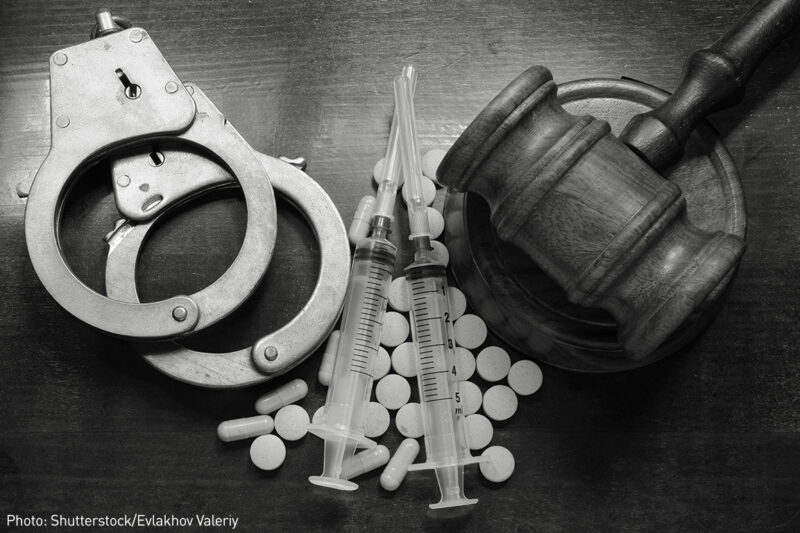ItÔÇÖs Time to Decriminalize Personal Drug Use and Possession. Basic Rights and Public Health Demand It.


Police arrest more people for drug possession than any other crime in America. Every 25 seconds someone is arrested for possessing drugs for their own use, amounting to 1.25 million arrests per year. These numbers tell a tale of ruined lives, destroyed families, and communities suffering under a suffocating police presence.
For the past year I have been investigating how the law enforcement approach to personal drug use has failed. The resulting report, ÔÇ£Every 25 Seconds: The Human Toll of Criminalizing Drug Use in the United States,ÔÇØ calls on state legislatures and Congress to decriminalize personal drug use and possession. It comes at a time when the country is recognizing that the so-called ÔÇ£war on drugsÔÇØ hasnÔÇÖt stopped drug dependence and that we desperately need to address the problems of mass incarceration, race, policing, and drug policy.
For personal drug use, it is time to replace our criminal justice model with a public health one instead.
The consequences of arresting, prosecuting, and incarcerating people for personal drug use are devastating. I met people who were prosecuted for tiny amounts of drugs, in one case an amount so small that the laboratory could not even weigh it and simply called it ÔÇ£trace.ÔÇØ That man was sentenced to 15 years in Texas.
On any given day, nearly 140,000 people are behind bars for drug possession, while tens of thousands more are cycling through jails and prisons or struggling to make ends meet on probation or parole. Still others are serving sentences for other offenses that have been lengthened because of a prior conviction for drug possession. A conviction for drug possession can keep people from accessing welfare assistance and even the voting booth. It can also subject them to stigma and discrimination by potential landlords, employers, and peers.
I met a woman IÔÇÖll call ÔÇ£NicoleÔÇØ in the Harris County Jail in Texas. Nicole was detained pretrial for months on felony drug possession charges for residue inside paraphernalia. While she was in jail, her newborn learned to sit up on her own. When the baby visited jail, she couldnÔÇÖt feel her motherÔÇÖs touch because there was glass between them.
Nicole ultimately pled guilty to possession of 0.01 grams of heroin. She would return to her children later that year, but as a ÔÇ£felonÔÇØ and ÔÇ£drug offender.ÔÇØ She would have to drop out of school because she no longer qualified for financial aid. She would no longer be able to have a lease in her name and would have trouble finding a job. And she would no longer qualify for the food stamps she had relied on to feed her family.
Forty-five years after the ÔÇ£war on drugsÔÇØ was declared, rates of drug use havenÔÇÖt significantly declined, and criminalization hasnÔÇÖt stopped drug dependence. In fact, criminalization has driven drug use underground, making it harder for people who use drugs to access the help they sometimes really want and need. The ÔÇ£war on drugsÔÇØ has caused enormous harm to individuals and families ÔÇö harm that often outstrips the harm of drug use itself. And it has made communities less safe by deeply corroding the relationship between police and communities of color and focusing precious law enforcement resources on nonviolent drug use instead of violent crimes, less than half of which result in an arrest.
Our research also reiterates that enforcement of U.S. drug laws and policy discriminates against communities of color. Although Black and white people use drugs at equivalent rates, a Black person is 2.5 times more likely to be arrested for drug possession. In many states that ratio is significantly higher. In Manhattan, a Black person is 11 times more likely to be arrested for drug possession than a white person.
As Lisa Ladd told me in New Orleans, the scales of justice are out of balance. LisaÔÇÖs son, Corey Ladd, was sentenced to 20 years in prison for possessing half an ounce of marijuana. His prior convictions were also for drug possession, and so under Louisiana law he was treated as a ÔÇ£habitual offenderÔÇØ because of habitual drug use.
CoreyÔÇÖs only child, Charlee, was born while he was incarcerated; he held her in his arms for the first time in Angola prison. Charlee is four now and thinks she visits her father at work. Corey told me, ÔÇ£She asks when IÔÇÖm going to get off work and come see her.ÔÇØ Charlee could be a teenager by the time her father comes home.
It is time for state legislatures and Congress to decriminalize personal drug use and possession. Decriminalization needs to be paired with a stronger investment in public health, emphasizing evidence-based prevention; education around the risks of drug use and dependence; and voluntary, affordable treatment and other social services in the community. Decriminalizing personal drug use and possession will improve countless lives.
ItÔÇÖs the moral responsibility of our government to enact this change for the health and liberty of the nation.

